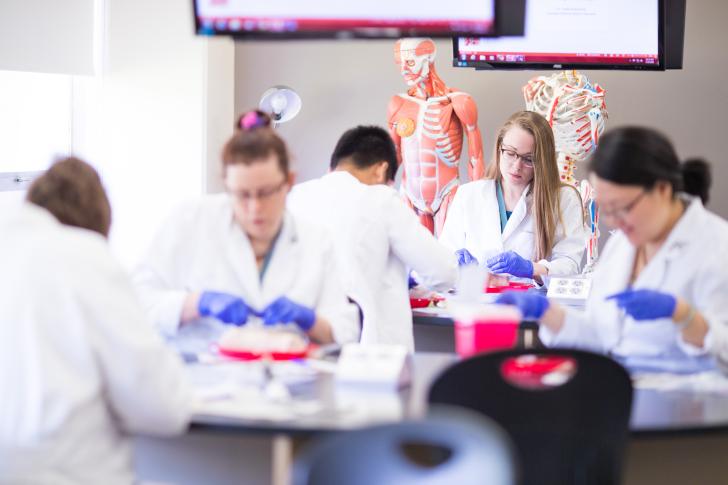Master of Science in Nutrition/Didactic Program in Dietetics Overview
There are many ways to turn your passion for food and nutrition into a fulfilling profession. Through a hands-on curriculum and holistic education, Bastyr’s Master of Science in Nutrition/Didactic Program in Dietetics (MSN/DPD) gives you the training you need to feel confident in pursuing a successful career in nutrition.
Accredited by the Accreditation Council for Education in Nutrition and Dietetics (ACEND), this program will prepare you to practice nutrition counseling in a vast number of clinical settings such as private practice, hospitals, eating disorder treatment centers, rehabilitation and addiction centers, and more.
MSN/Didactic Program in Dietetics Highlights
ACEND Accredited
92
Number of Clinical Hours of Training
Internship Match Rates 100%
Expected Didactic Program in Dietetics Outcomes
Upon completion of Basytr’s Nutrition/Didactic Program in Dietetics program, students will be prepared to:
- Apply for and be successful in a supervised practice program accredited by the Accreditation Council for Education in Nutrition and Dietetics (ACEND)
- Complete the academic and competency requirements for registered dietitian (RDN) eligibility.
- Become RDNs who will be agents of change in bringing the perspective of whole foods, environmental awareness of food choices, and integrative medicine into their dietetic and nutrition-related practices
Program Details
The curriculum tables that follow list the tentative schedule of courses each quarter.
Year I
Fall
TR5100 Biostatistics (4 credits)
TR5104 Research Methods in Health Sciences (3 credits)
TR5120 Advanced Nutrition: Macronutrients (5 credits)
TR5136 Nutrition in the Life Cycle (3 credits)
Winter
BC5118 Disease Processes 1 (3 credits)
TR5124 Advanced Nutrition: Micronutrients (5 credits)
TR5138 Counseling Skills for RDNs Lecture/Lab (4 credits)
TR5320 Nutrition Assessment and Therapy 1 (5 credits)
Spring
BC5132 Disease Processes 2 (2 credits)
TR5101 Whole Foods Production (3 credits)
TR5141 Advanced Nutrition: Bioactive Compounds, Nutrigenomics, and Microbiome (3 credits)
TR5321 Nutrition Assessment and Therapy 2 (5 credits)
TR5803 Nutrition Clinic Entry (1 credit)
Year II
Fall
RD6105 Introduction to Dietetics (1 credit)
RD6130 Food Safety and the Principles of Quantity Food Production (2 credits)
TR5115 Food Science (5 credits)
TR6111 Contemporary Nutrition: Global and Ecological Issues (2 credits)
TR6811 Clinic Nutrition Practicum 1 (2 credits)
Total Credits 12
Winter
RD6135 Food Service Management Skills (2 credits)
TR6100 Nutritional Supplementation (4 credits)
TR6122 Contemporary Nutrition: Community and Culture (3 credits)
TR6127 Therapeutic Cooking: Illness and Recovery (2 credits)
TR6122 is a hybrid/on-line course.
Spring
RD6141 Food Service Capstone (1 credit)
RD6403 Medical Nutrition Therapy (3 credits)
TR6133 Contemporary Nutrition: Public Health (3 credits)
TR6812 Clinic Nutrition Practicum 2 (2 credits)
Students may take individual, science-based prerequisites as a non-matriculated student. If you wish to discuss taking specific prerequisites at Bastyr, please contact Admissions. Here is a list of courses offered.
- Bachelor’s degree from a regionally accredited college/university.
- Minimum GPA of 3.0 in undergraduate degree required to be considered for admission.
- Entering students must have a bachelor’s degree from a regionally accredited college/university and a minimum GPA of 3.0, or a 3.0 in the last 45 credits in their undergraduate degree, or a B or better in Human Physiology, Organic Chemistry, Biochemistry, and Microbiology, and a C or better in all other prerequisite courses. Exceptional candidates who do not meet these standards will be reviewed on a case-by-case basis.
Human Physiology or a combined Human Anatomy and Physiology course - 1 course
Organic Chemistry* - 1 course
Biochemistry* - 1 course
Introductory Nutrition - 1 course
General Psychology - 1 course
College Algebra or Statistics - 1 course
Microbiology - 1 course
*Must be science-major level (not survey level) with at least one lab in either organic chemistry or biochemistry
Note: Biochemistry course must have been taken within seven years of program start.
View list of prerequisite courses available at Bastyr University.
Bastyr accepts graduate and undergraduate transfer credits earned at accredited colleges and universities. Learn what you need to make this process go smoothly.
For more information on loans and scholarships, visit financial aid.
Some available careers in nutrition are as follows:
- Registered Dietitian Nutritionist* in a vast number of clinical settings such as private practice, hospitals, eating disorder treatment centers, rehabilitation and addiction centers, and more.
- Public health programs and administration
- Corporate wellness
- Food and nutrition consulting and writing
- Future academic career in a university, administrative, government or public health setting
- Research in a clinical or laboratory environment
*Upon graduation, students have fulfilled the academic requirements to pursue a dietetic internship on the path to gaining the RDN credential.
In addition to successful completion of a Didactic Program in Dietetics (DPD), to become a registered dietitian nutritionist (RDN) a student must accomplish the following:
- Obtain a minimum of a master's degree at a US regionally accredited university or college.
- Receive a verification statement of coursework completion from an ACEND-accredited program (Accreditation Council for Education in Nutrition and Dietetics), which is required for admission to ACEND-accredited supervised practice programs/dietetic internships.
- Information on ACEND-accredited programs (e.g., didactic, coordinated, and dietetic internships) can be found on the Academy of Nutrition and Dietetics website.
- Apply for a supervised practice program/dietetic internship through an online platform called the Dietetic Internship Centralized Application Service (DICAS). More information about DICAS and preparing the online application on the DICAS Portal.
- Further explanation of the DICAS application and computer matching process can be found here.
- Complete an ACEND-accredited supervised practice program, i.e., a dietetic internship and receive a verification statement of completion.
- Successfully pass the Commission on Dietetic Registration (CDR) credentialing examination for registered dietitian nutritionists.
To practice as an RDN, one must also obtain state-specific certification or licensure, as applicable. Additional information regarding state licensing agencies and requirements can be found here and here. Potential applicants should also be aware that effective in 2024, a master’s degree will be required to take the credentialing examination for registered dietitian nutritionists. For more information regarding careers in the field of dietetics, visit the Academy of Nutrition and Dietetics.

Explore Careers in Nutrition
Jobs in nutrition are on the rise. According to the U.S. Bureau of Labor Statistics, the employment of dietitians and nutritionists is projected to grow by 7 percent from 2023-33, which is faster than average for all occupations. Access our nutrition career guide to explore the many jobs in nutrition available today and discover the best nutrition degree program for you.






